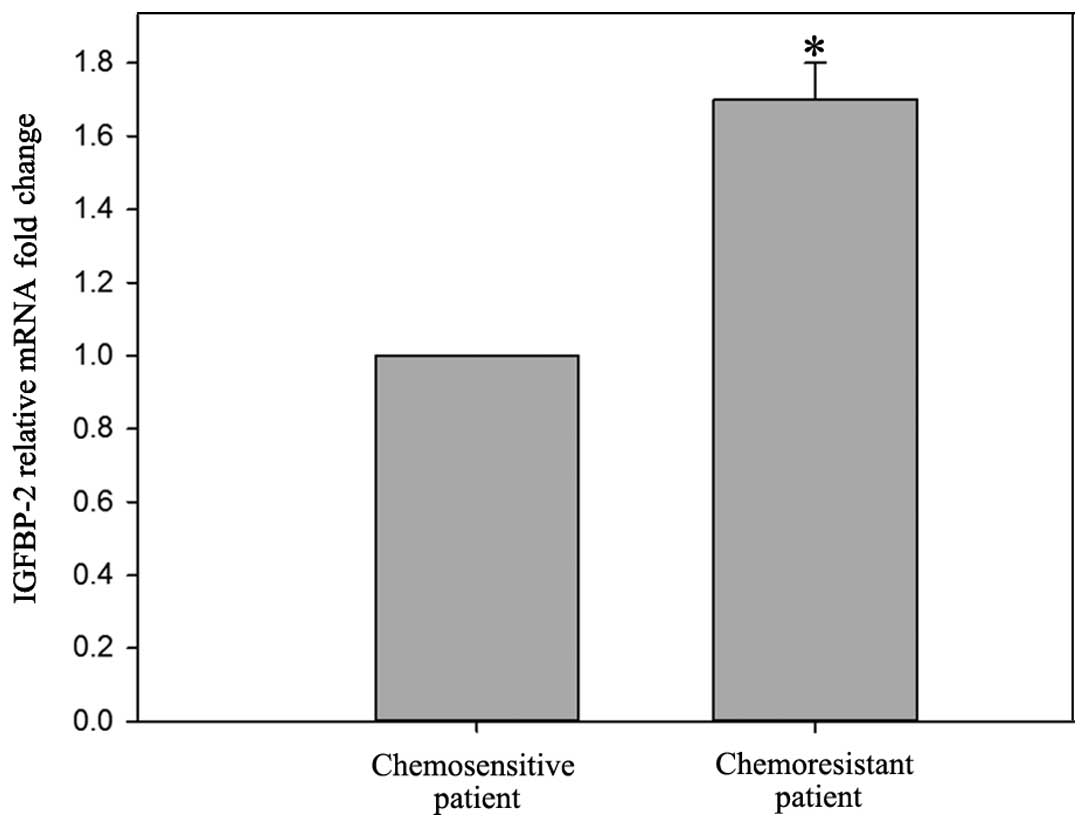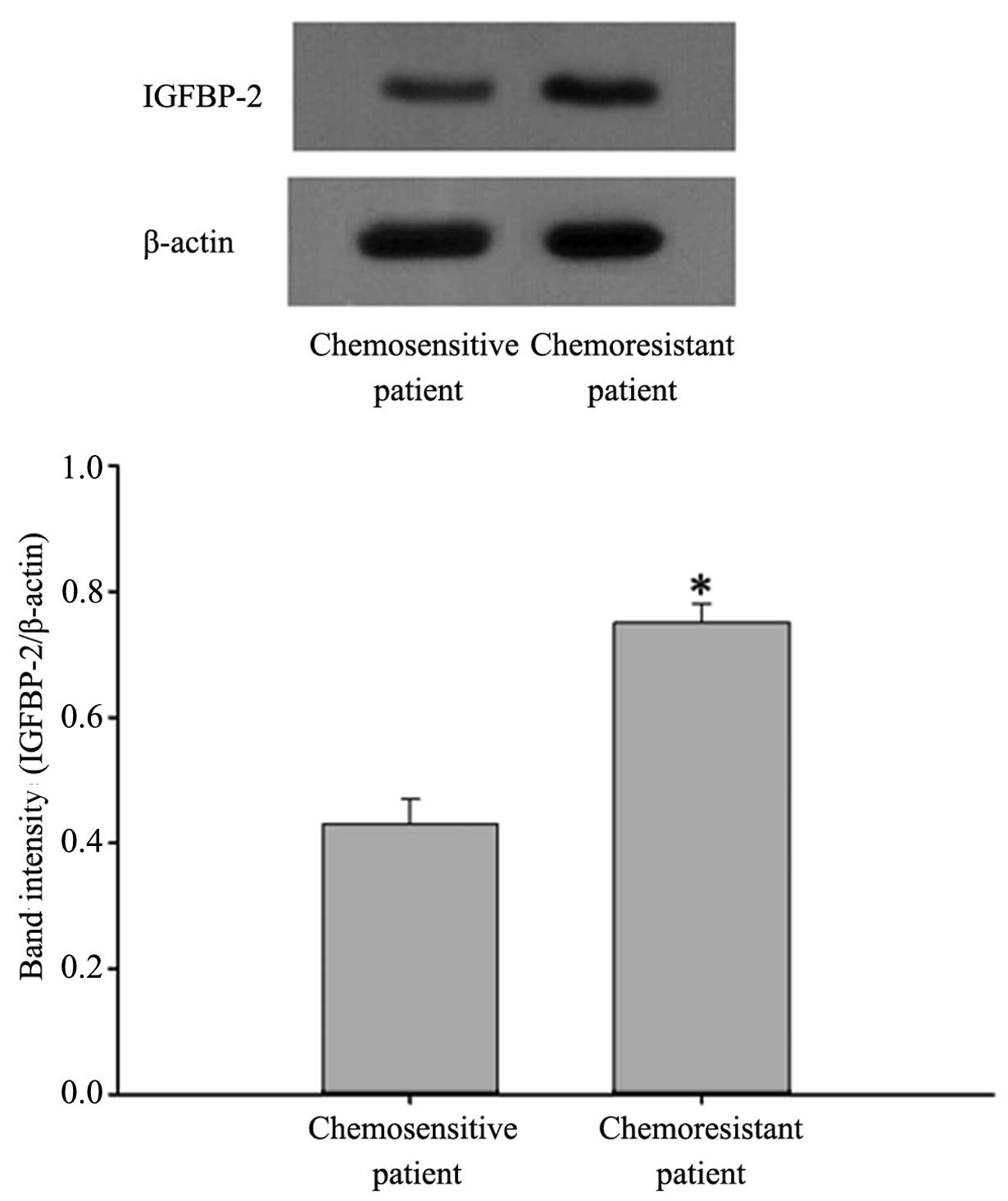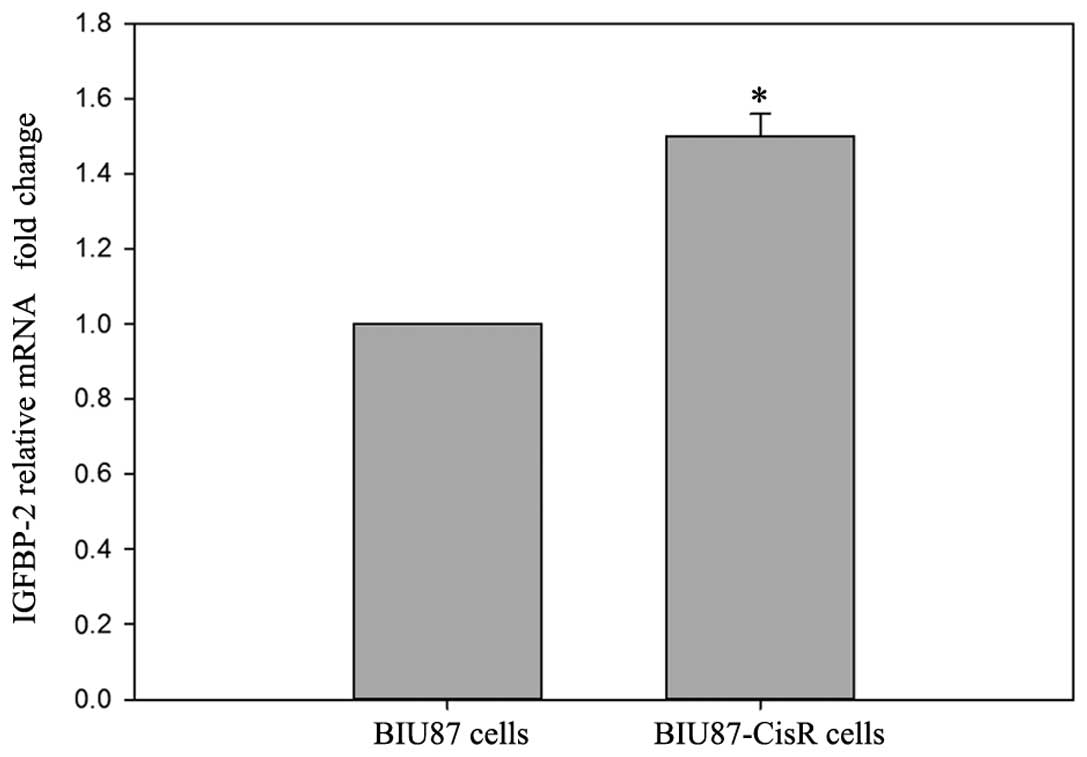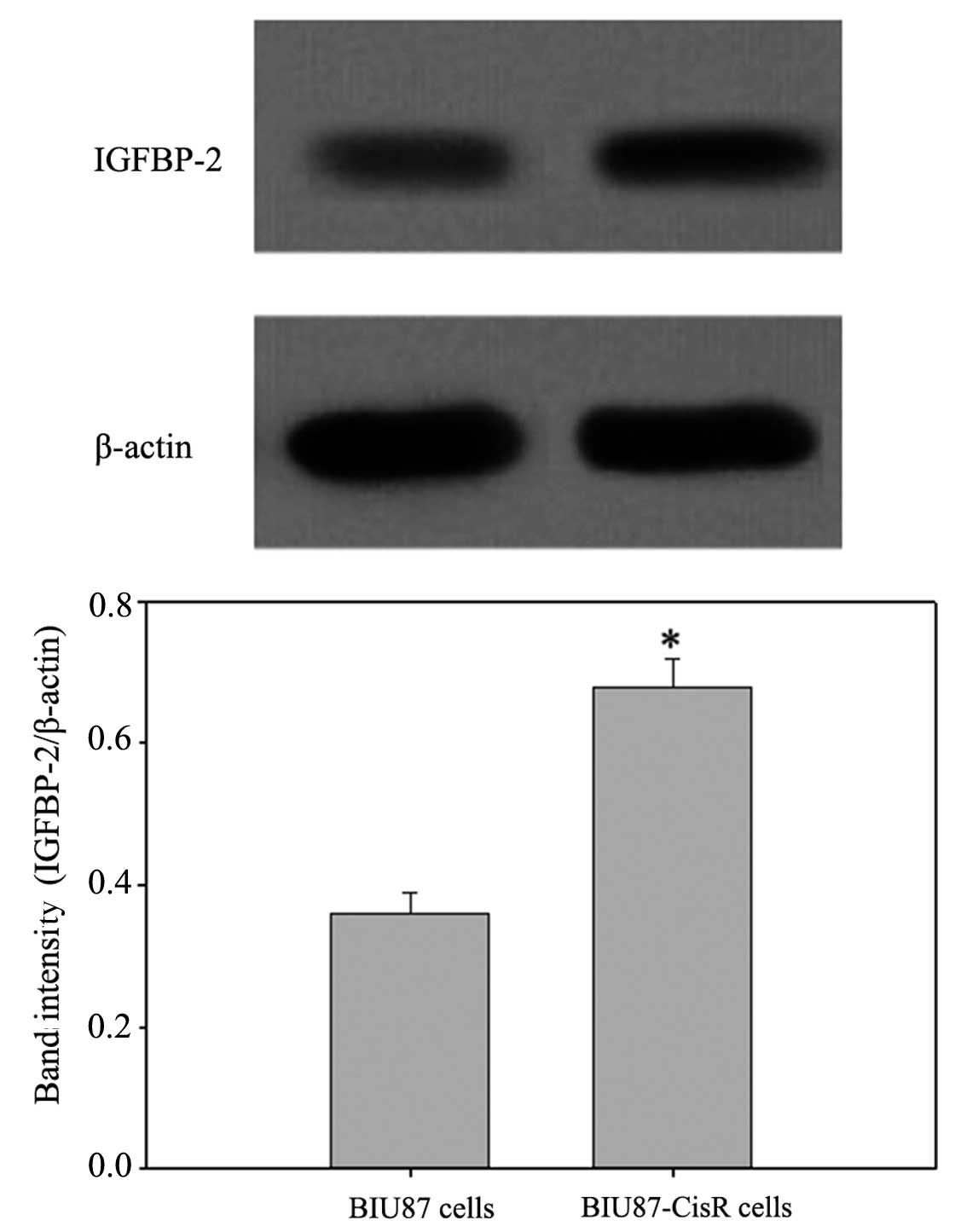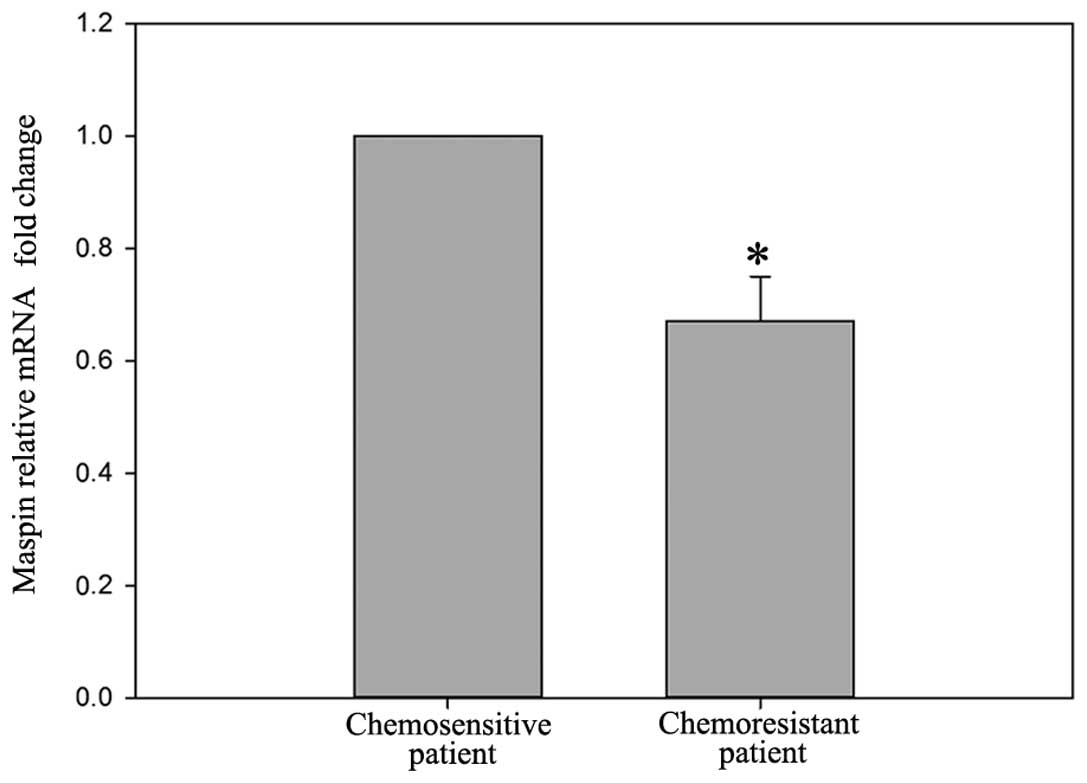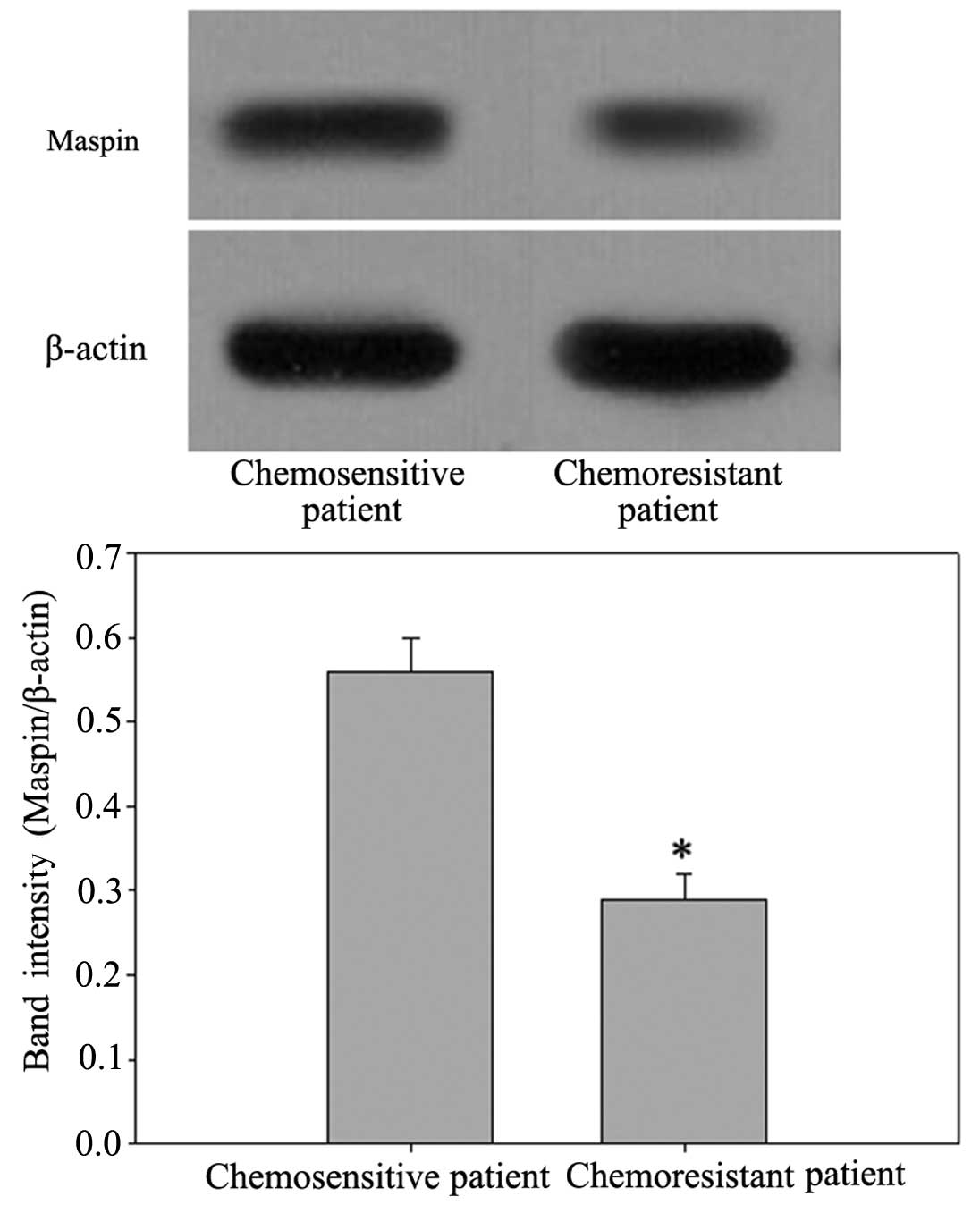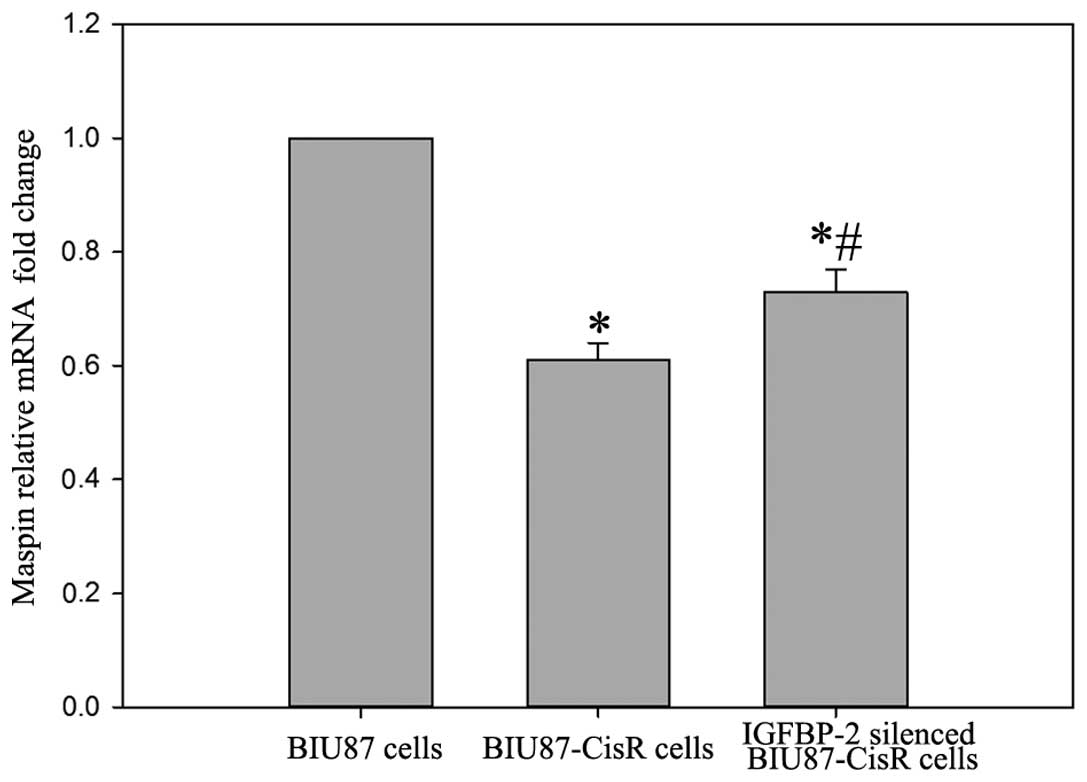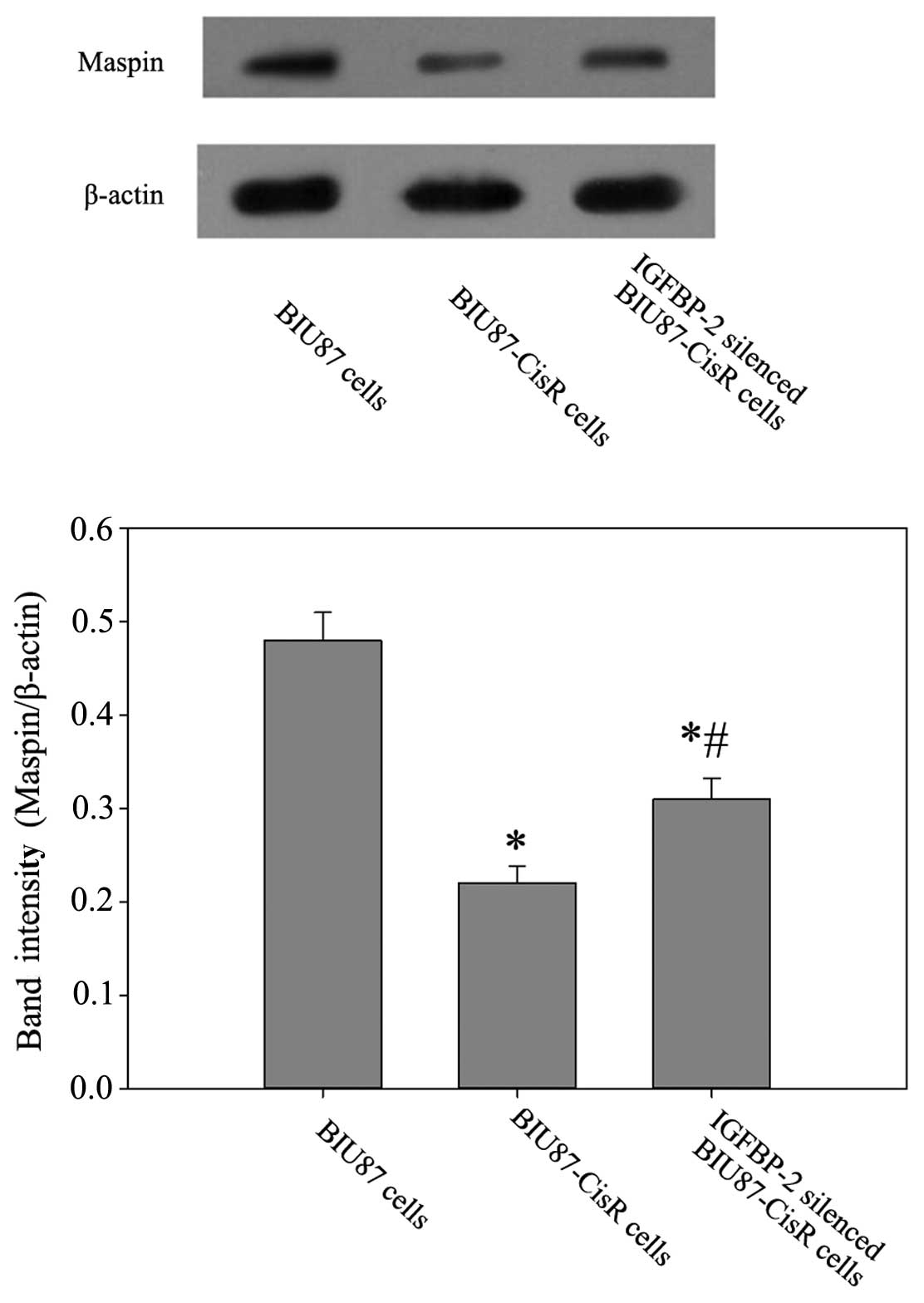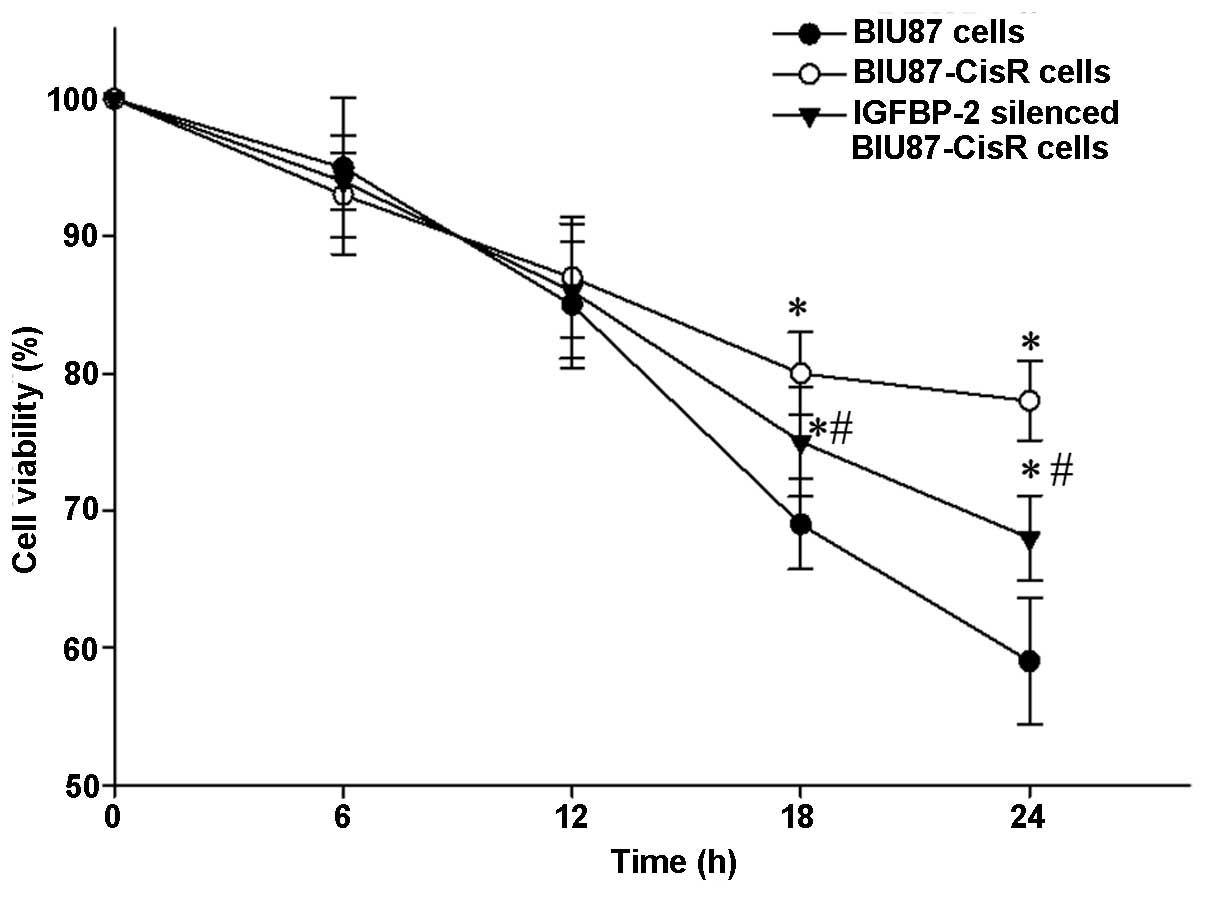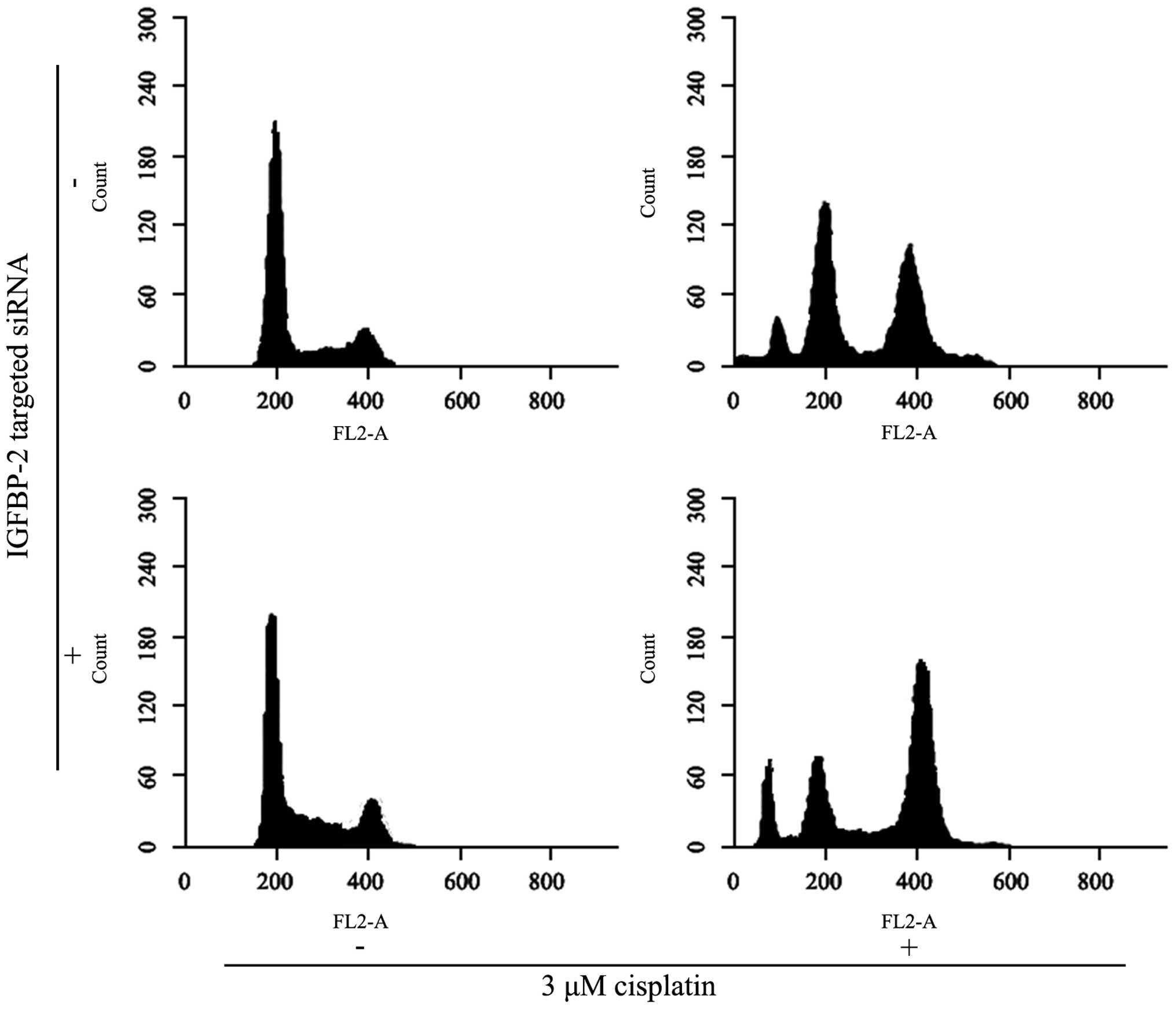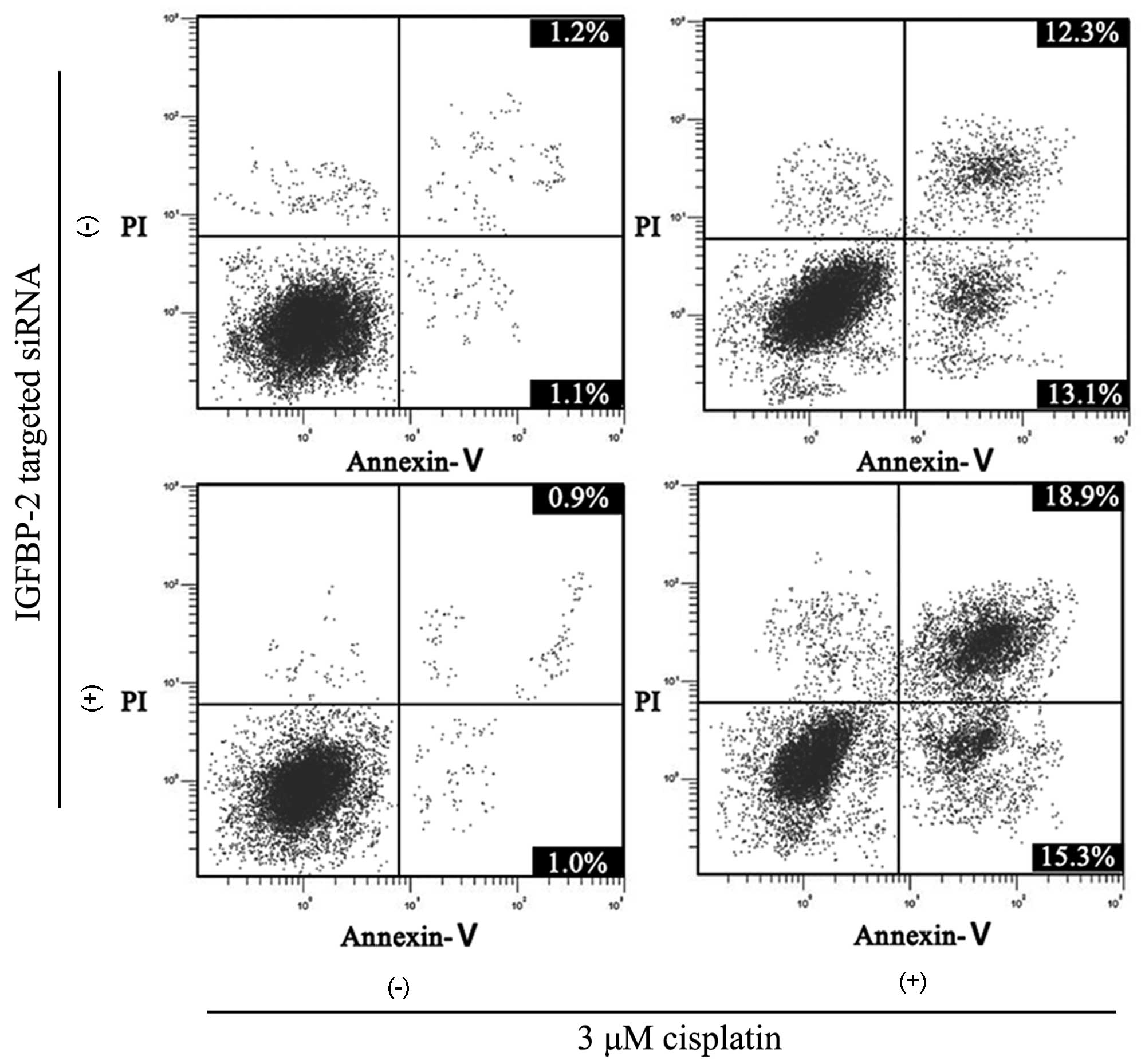|
1
|
Xu W, Wang F, Ying L and Wang HH:
Association between glutathione S-transferase M1 null variant and
risk of bladder cancer in Chinese Han population. Tumour Biol.
35:773–777. 2014. View Article : Google Scholar
|
|
2
|
Costantini C and Millard F: Update on
chemotherapy in the treatment of urothelial carcinoma.
ScientificWorldJournal. 11:1981–1994. 2011. View Article : Google Scholar : PubMed/NCBI
|
|
3
|
Shirato A, Kikugawa T, Miura N, et al:
Cisplatin resistance by induction of aldo-keto reductase family 1
member C2 in human bladder cancer cells. Oncol Lett. 7:674–678.
2014.PubMed/NCBI
|
|
4
|
Galluzzi L, Vitale I, Michels J, et al:
Systems biology of cisplatin resistance: past, present and future.
Cell Death Dis. 5:e12572014. View Article : Google Scholar : PubMed/NCBI
|
|
5
|
Hjortebjerg R and Frystyk J: Determination
of IGFs and their binding proteins. Best Pract Res Clin Endocrinol
Metab. 27:771–781. 2013. View Article : Google Scholar : PubMed/NCBI
|
|
6
|
Malaguarnera R and Belfiore A: The
emerging role of insulin and insulin-like growth factor signaling
in cancer stem cells. Front Endocrinol (Lausanne). 5:102014.
|
|
7
|
Lancaster JM, Sayer RA, Blanchette C, et
al: High expression of insulin-like growth factor binding protein-2
messenger RNA in epithelial ovarian cancers produces elevated
preoperative serum levels. Int J Gynecol Cancer. 16:1529–1535.
2006. View Article : Google Scholar : PubMed/NCBI
|
|
8
|
Zhang Y, Ying X, Han S, et al:
Autoantibodies against insulin-like growth factorbinding protein-2
as a serological biomarker in the diagnosis of lung cancer. Int J
Oncol. 42:93–100. 2013.
|
|
9
|
Uzoh CC, Holly JM, Biernacka KM, et al:
Insulin-like growth factor-binding protein-2 promotes prostate
cancer cell growth via IGF-dependent or -independent mechanisms and
reduces the efficacy of docetaxel. Br J Cancer. 104:1587–1593.
2011. View Article : Google Scholar : PubMed/NCBI
|
|
10
|
Hoeflich A, Fettscher O, Preta G, et al:
Increased activity of catalase in tumor cells overexpressing
IGFBP-2. Horm Metab Res. 35:816–821. 2003. View Article : Google Scholar
|
|
11
|
Wheatcroft SB and Kearney MT:
IGF-dependent and IGF-independent actions of IGF-binding protein-1
and -2: implications for metabolic homeostasis. Trends Endocrinol
Metab. 20:153–162. 2009. View Article : Google Scholar : PubMed/NCBI
|
|
12
|
Biernacka KM, Uzoh CC, Zeng L, et al:
Hyperglycaemia-induced chemoresistance of prostate cancer cells due
to IGFBP2. Endocr Relat Cancer. 20:741–751. 2013. View Article : Google Scholar : PubMed/NCBI
|
|
13
|
Dokmanovic M, Shen Y, Bonacci TM, et al:
Trastuzumab regulates IGFBP-2 and IGFBP-3 to mediate growth
inhibition: implications for the development of predictive
biomarkers for trastuzumab resistance. Mol Cancer Ther. 10:917–928.
2011. View Article : Google Scholar : PubMed/NCBI
|
|
14
|
Snoeren N, Emmink BL, Koerkamp MJ, et al:
Maspin is a marker for early recurrence in primary stage III and IV
colorectal cancer. Br J Cancer. 109:1636–1647. 2013. View Article : Google Scholar : PubMed/NCBI
|
|
15
|
Hall DC, Johnson-Pais TL, Grubbs B, Bernal
R, Leach RJ and Padalecki SS: Maspin reduces prostate cancer
metastasis to bone. Urol Oncol. 26:652–658. 2008. View Article : Google Scholar : PubMed/NCBI
|
|
16
|
Machowska M, Wachowicz K, Sopel M and
Rzepecki R: Nuclear location of tumor suppressor protein maspin
inhibits proliferation of breast cancer cells without affecting
proliferation of normal epithelial cells. BMC Cancer. 14:1422014.
View Article : Google Scholar : PubMed/NCBI
|
|
17
|
Livak KJ and Schmittgen TD: Analysis of
relative gene expression data using real-time quantitative PCR and
the 2(-Delta Delta C(T)) Method. Methods. 25:402–408. 2001.
View Article : Google Scholar
|
|
18
|
Shariat SF, Milowsky M and Droller MJ:
Bladder cancer in the elderly. Urol Oncol. 27:653–667. 2009.
View Article : Google Scholar : PubMed/NCBI
|
|
19
|
Drayton RM, Dudziec E, Peter S, et al:
Reduced expression of miRNA-27a modulates cisplatin resistance in
bladder cancer by targeting the cystine/glutamate exchanger
SLC7A11. Clin Cancer Res. 20:1990–2000. 2014. View Article : Google Scholar : PubMed/NCBI
|
|
20
|
Svatek RS, Hollenbeck BK, Holmang S, et
al: The economics of bladder cancer: costs and considerations of
caring for this disease. Eur Urol. 66:253–262. 2014. View Article : Google Scholar : PubMed/NCBI
|
|
21
|
Lu H, Wang L, Gao W, et al: IGFBP2/FAK
pathway is causally associated with dasatinib resistance in
non-small cell lung cancer cells. Mol Cancer Ther. 12:2864–2873.
2013. View Article : Google Scholar : PubMed/NCBI
|
|
22
|
Kühnl A, Kaiser M, Neumann M, et al: High
expression of IGFBP2 is associated with chemoresistance in adult
acute myeloid leukemia. Leuk Res. 35:1585–1590. 2011. View Article : Google Scholar : PubMed/NCBI
|
|
23
|
Fukushima T and Kataoka H: Roles of
insulin-like growth factor binding protein-2 (IGFBP-2) in
glioblastoma. Anticancer Res. 27:3685–3692. 2007.PubMed/NCBI
|
|
24
|
Migita T, Narita T, Asaka R, et al: Role
of insulin-like growth factor binding protein 2 in lung
adenocarcinoma: IGF-independent antiapoptotic effect via caspase-3.
Am J Pathol. 176:1756–1766. 2010. View Article : Google Scholar : PubMed/NCBI
|
|
25
|
Frommer KW, Reichenmiller K, Schutt BS, et
al: IGF-independent effects of IGFBP-2 on the human breast cancer
cell line Hs578T. J Mol Endocrinol. 37:13–23. 2006. View Article : Google Scholar : PubMed/NCBI
|
|
26
|
Taskiran C, Erdem O, Onan A, et al: Maspin
expression in endometrial hyperplasia and carcinoma, and its
relation with angiogenesis. Eur J Gynaecol Oncol. 35:134–139.
2014.PubMed/NCBI
|
|
27
|
Romani AA, Soliani P, Desenzani S, et al:
The associated expression of maspin and Bax proteins as a potential
prognostic factor in intrahepatic cholangiocarcinoma. BMC Cancer.
6:2552006. View Article : Google Scholar : PubMed/NCBI
|
|
28
|
Rivenbark AG, Stolzenburg S, Beltran AS,
et al: Epigenetic reprogramming of cancer cells via targeted DNA
methylation. Epigenetics. 7:350–360. 2012. View Article : Google Scholar : PubMed/NCBI
|















